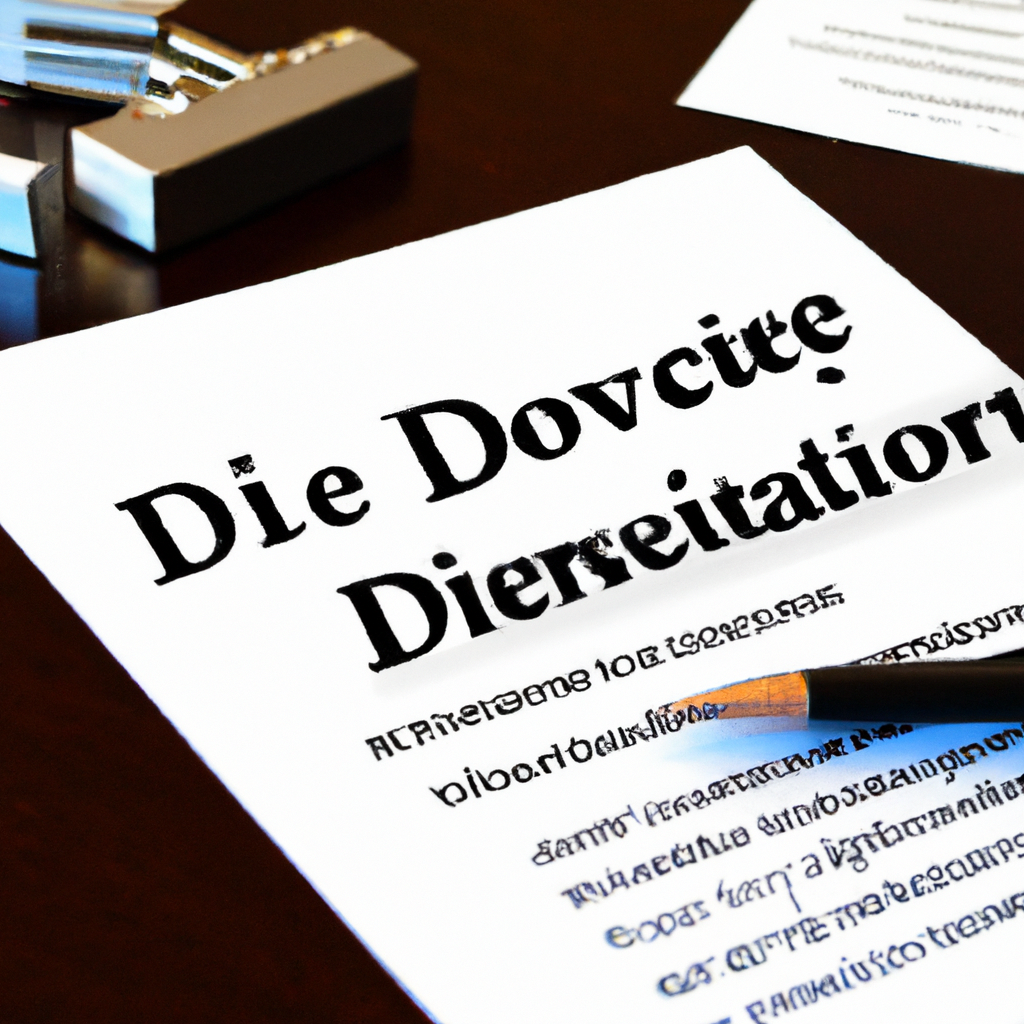In the blink of an eye, two paths that were once intertwined can suddenly converge, setting off a labyrinthine journey towards legal dissolution. Divorce, an intricate web spun from the threads of emotions, decisions, and compromises, carries with it an air of uncertainty. For couples residing in the picturesque state of Colorado, amidst towering mountains and endless skies, understanding the tempo of this disentanglement dance becomes crucial. Tucked beneath the regal peaks of the Rockies, the question lingers in the minds of those parting ways: how long does divorce take in Colorado? In this article, we shall navigate the complexities of time, procedure, and the distinct variables that color the canvas of divorce, lending a guiding hand to those yearning for clarity amidst a whirlwind of change. Step aboard, divorcing souls, as we uncover the hushed whispers of justice’s ticking clock in the enchanting landscape of Colorado.
Table of Contents
- Understanding the Timeline of Divorce Proceedings in Colorado
- Factors Influencing the Duration of a Divorce in Colorado
- Navigating the Legal Landscape: Steps and Timelines Involved in the Divorce Process
- Efficient Strategies for Streamlining the Divorce Process in Colorado
- Key Considerations for a Faster Divorce in Colorado
- Practical Tips to Expedite the Divorce Process in Colorado
- Q&A
- Closing Remarks

Understanding the Timeline of Divorce Proceedings in Colorado
Divorce can be a complex process, but can help alleviate some of the uncertainty. Here is a breakdown of the stages involved in a typical divorce case in the beautiful state of Colorado.
Filing the Petition: To initiate the divorce process, one spouse must file a Petition for Dissolution of Marriage with the appropriate Court. This document outlines the grounds for divorce and any requests for child custody, support, and division of assets. Once filed, the petitioner must serve the other spouse with a copy of the petition.
Response and Temporary Orders: Upon receiving the petition, the respondent has a specified period to file a response. At this stage, temporary orders may be issued to address matters like temporary child custody, support, and use of shared property. These orders help maintain stability during the divorce proceedings until a final resolution is reached.
Discovery and Negotiation: The next stage involves the exchange of information relevant to the case, which represents the process of discovery. This may include financial documents, expert opinions, and other evidentiary items. Subsequently, negotiation between both parties, either through mediation or with the help of attorneys, takes place to reach agreements on various issues such as property division, child custody, and alimony.
Court Proceedings: If negotiations fail, the case may proceed to a court trial. A judge will hear the arguments from both sides, review the evidence, and make decisions on unresolved matters. It is important to note that court proceedings can significantly extend the timeline of a divorce case.
Finalization: Once all disputes are resolved, either through negotiation or court proceedings, a final divorce decree is drafted. This document formally terminates the marriage and details the final agreements made. After the decree is signed by both parties and approved by the Court, the divorce becomes finalized, marking the end of the proceedings.
Going through a divorce can be emotionally challenging, but can help provide clarity and manage expectations throughout the process. Remember that each case is unique, and consulting with an experienced family law attorney is crucial to navigate this complex legal journey successfully.

Factors Influencing the Duration of a Divorce in Colorado
When going through a divorce in Colorado, several factors come into play that can significantly impact the duration of the process. Understanding these factors is essential for individuals seeking a smooth and efficient divorce. So, what are the key elements that can influence how long it takes to finalize a divorce in Colorado? Let’s dive in!
1. Complexity of Assets: The complexity and number of assets shared by the couple can greatly affect the duration of a divorce. Splitting assets such as properties, businesses, investments, and retirement funds can involve extensive negotiations and legal procedures, potentially prolonging the divorce process.
2. Degree of Conflict: The level of disagreement and conflict between spouses can significantly impact the duration of a divorce. Couples who are able to maintain open lines of communication and work towards mutually agreeable solutions, whether through mediation or collaborative divorce, can often expedite the process. However, high conflict divorces may require more time for negotiations, court hearings, and potentially even a trial, resulting in a longer divorce timeline.

Navigating the Legal Landscape: Steps and Timelines Involved in the Divorce Process
Going through a divorce can be a complex and emotionally challenging process. It is essential to understand the various steps and timelines involved in order to navigate the legal landscape smoothly. Here, we outline the crucial stages and approximate timeframes typically encountered during a divorce:
Gathering Initial Information
At the beginning of the divorce process, both parties are required to gather essential information to initiate the proceedings. This may include:
- Documentation of assets and liabilities
- Financial records such as bank statements, tax returns, and employment details
- Inventory of personal belongings
- Child-related information such as schedules, school records, and health documents
Understanding the importance of thorough documentation will help streamline the proceedings and ensure a fair settlement.
Filing the Divorce Petition
Once the initial information is collected, the next step involves filing the divorce petition with the court. This legal document formally initiates the divorce process and outlines the reasons for seeking a dissolution of marriage. After filing, the serving spouse needs to arrange for the other spouse to be formally served with the divorce papers.

Efficient Strategies for Streamlining the Divorce Process in Colorado
Divorce proceedings can often be emotionally and financially draining for all parties involved. However, by implementing some strategic approaches, you can help streamline the divorce process in Colorado and alleviate some of the associated stress. Here are a few efficient strategies to consider:
- Open and Honest Communication: Maintaining open lines of communication with your spouse can significantly expedite the divorce proceedings. Try to have respectful and transparent discussions about the key issues at hand, such as division of assets, child custody, and spousal support.
- Mediation and Alternative Dispute Resolution: Consider exploring mediation or other alternative dispute resolution methods before turning to litigation. These processes can help facilitate productive negotiations, reaching a compromise that satisfies both parties. This approach can save time, money, and keep matters out of court.
- Thorough Preparation and Documentation: Prioritize gathering all necessary paperwork, such as financial records, bank statements, and tax returns, to ensure the divorce process progresses smoothly. Keeping organized and having all required documents readily available can prevent unnecessary delays and complications in court.
These strategies serve to optimize the divorce process, making it more efficient and less burdensome for all parties involved. Remember, each divorce is unique, and seeking professional guidance from an experienced family law attorney is highly recommended to navigate through legal complexities.

Key Considerations for a Faster Divorce in Colorado
When going through a divorce in Colorado, there are several key factors to keep in mind to ensure a smoother and expedited process. By understanding these considerations, you can take proactive steps towards achieving a faster divorce, minimizing stress and maximizing efficiency. Here are some crucial points to consider:
- Choosing the right divorce process: Opting for an uncontested divorce or collaborative divorce can significantly speed up the proceedings compared to a traditional contested divorce. These alternative processes encourage amicable negotiations and can help avoid a lengthy court battle.
- Preparing financial documentation: Gather all necessary financial records and documents well in advance. This will help streamline property division, alimony, and child support decisions. Having accurate and organized financial information readily available can expedite the resolution of financial matters.
- Open lines of communication: Effective communication between you and your ex-spouse, particularly regarding child custody and visitation arrangements, can expedite the divorce process. Maintaining a productive dialogue and considering mediation or alternative dispute resolution methods can help you reach mutually agreed-upon decisions more efficiently.
By considering these key factors, you can navigate the divorce process more swiftly and with fewer complications. Be sure to consult with a reputable divorce attorney who can guide you through the specific details of your case and help you make informed decisions. Remember, a faster divorce does not mean rushing through important matters; it means taking proactive steps towards a mutually beneficial resolution.

Practical Tips to Expedite the Divorce Process in Colorado
When going through a divorce, it’s natural to want the process to be as quick and smooth as possible. Here are some practical tips to help expedite your divorce in Colorado:
- Obtain legal advice: Start by consulting with a knowledgeable divorce attorney who can guide you through the legal complexities and provide personalized advice based on your circumstances.
- Prepare documentation: Gather all necessary paperwork such as financial documents, property records, and any relevant communications. Having these organized and readily available can save significant time during the proceedings.
- Consider mediation: Opting for mediation can help facilitate negotiations and compromise, leading to a more streamlined divorce process. A neutral mediator can assist in finding mutually agreeable solutions, potentially avoiding lengthy court battles.
Furthermore, it is crucial to remain focused and maintain open communication with your ex-spouse throughout the divorce. Remember that a cooperative attitude can go a long way in expediting the process. Collaborating on key decisions, such as child custody and asset division, can help reduce conflict and save both time and emotional energy.
Q&A
Q: Looking to uncouple in Colorado? Curious about how long the divorce process takes? We’ve got you covered!
Q: So, what’s the scoop on divorce timelines in Colorado?
Q: Need a quick escape from your marriage? How long will it take?
Q: Wondering how much time you should set aside for your divorce journey in Colorado?
Q: Seeking the speediest route to singlehood in the Rockies? How long can you expect your divorce to last?
Q: How long will your Colorado divorce adventure last? Let’s find out!
Q: Okay, spill the beans—how long can divorces stretch in Colorado?
Q: Curious minds want to know—how much time will you be spending in the divorce process?
Q: Are you prepared for the duration of your divorce expedition through the Centennial State?
Q: Time is of the essence—how quickly can I finalize my divorce in Colorado?
Q: Craving a swift resolution? Are Colorado divorces known to be speedy?
Q: In a hurry to put this chapter behind you? What are the chances of a quick turnaround?
Q: Want to expedite your divorce proceedings in Colorado? We’ve got the inside scoop!
Q: Is there a mandatory waiting period for divorces in Colorado?
Q: Are you required to put your divorce plans on hold for a certain period in Colorado?
Q: Can you skip the waiting game when it comes to divorcing in the great state of Colorado?
Q: Wondering if your divorce will come with an unexpected pause? Let’s clear the air!
Q: What factors influence the length of a divorce in Colorado?
Q: What variables can impact the duration of your divorce process in Colorado?
Q: Curious about the potential roadblocks that might delay your divorce in Colorado? We’ve got the lowdown!
Q: Can my divorce process be shorter if we agree on everything?
Q: If my spouse and I are on the same page, does it speed up the divorce process?
Q: Will having an uncontested divorce make things go faster in Colorado?
Q: Seeking harmony and a quicker divorce? Let’s discover the benefits of an amicable split!
Q: Any tips for expediting a divorce in Colorado?
Q: Need some advice on fast-tracking your divorce proceedings in Colorado?
Q: Interested in hacks for a swifter divorce experience?
Q: Ready to turbocharge your Colorado divorce journey? We’ve got insider tips!
Q: Is there a maximum or minimum timeframe for divorces in Colorado?
Q: Wondering if there’s a legal timetable dictating your divorce duration in Colorado?
Q: Is there a limit to how fast or slow your divorce journey can be in Colorado?
Q: Can you control the pace of your divorce process in the Rocky Mountain State?
Q: How does the complexity of assets or child custody impact divorce timelines in Colorado?
Q: Can the complexity of dividing assets or custody arrangements affect the duration of your Colorado divorce?
Q: Wondering how your child custody or high-value assets might slow down your divorce proceedings? Let’s dig deeper!
Q: Any quirky or interesting stories about unusually long or short divorce cases in Colorado?
Q: Tantalized by juicy anecdotes of exceptionally swift or protracted divorces in Colorado?
Q: Want to hear some captivating tales of divorces that broke all the time frames in Colorado?
Q: Fascinated by extraordinary divorce stories in the Centennial State? We have them right here!
Q: Are there any alternative dispute resolution methods that can expedite a Colorado divorce?
Q: Curious about mediation, arbitration, or collaborative divorce as time-saving alternatives in Colorado?
Q: Seeking alternative paths to accelerate your divorce process in Colorado? We’ve got some interesting alternatives for you to consider!
Remember, divorce processes can vary widely, so it’s crucial to consult a legal professional for personalized advice and accurate timelines based on your unique circumstances.
Wrapping Up
As our journey through the intricate tale of divorce in Colorado comes to an end, we find ourselves standing at the crossroads of patience and resolution. In this realm, time dances to the tune of its own elusive melody, twirling and pirouetting with hope and uncertainty. With a subject as deeply personal as divorce, the quest for answers to the question “How long does divorce take in Colorado?” can be filled with both trepidation and anticipation.
In the state that boasts the majestic Rocky Mountains as its crown jewel, the pursuit of marital freedom is an intricate process, delicately woven into the tapestry of legalities and emotions. As we navigated the labyrinthine corridors of the legal system, we discovered that divorce is not a simple matter of drawing a line in the sand and swiftly moving on. No, dear reader, it requires a delicate balance of patience, understanding, and the ever-watchful eye of justice.
A symphony of variables intertwines to determine the duration of a divorce in Colorado. From the individual complexities of the case to the whims of fate, each element plays its part in the dance towards resolution. Factors such as the presence of children, property division, and the need for spousal support cast their shadows upon this intricate choreography.
Though we may long for a definitive timeline, divorce in Colorado remains elusive, fluid like the Colorado River coursing through the heart of the land. Some find solace in the swift current of an uncontested divorce, taking mere months to reach the shores of freedom. Others, caught in the eddies of contention and disagreement, may find themselves locked in a marital battle that drags on for years.
We must remember, dear reader, that time, as ever, remains a fickle companion. Patience becomes an intrinsic virtue as we embark on this journey, recognizing that the length of time required for a divorce is as unique as the individuals involved. What for some may be a fleeting moment in the grand scheme of life can transform into an arduous trek through the wilderness for others.
So, as we gather the fragments of knowledge gleaned from our exploration of divorce in Colorado, let us not be disheartened by the unknown. Instead, let us forge ahead with the understanding that time is but a thread weaving its own enigmatic pattern. Hand in hand with patience and guided by the hand of impartiality, we navigate the uncertain terrain, grasping for resolution and a future unburdened.
In closing, let this exploration remind us that divorce is a delicate tango, compelling us to confront our deepest fears, desires, and vulnerabilities. With eyes firmly fixed on the horizon, we embark on this journey, ready to endure and persevere, knowing that in the end, the duration of a divorce in Colorado is a mere fragment of the story, but the beginning of a new chapter in the lives of those who seek solace in its transformative embrace.

